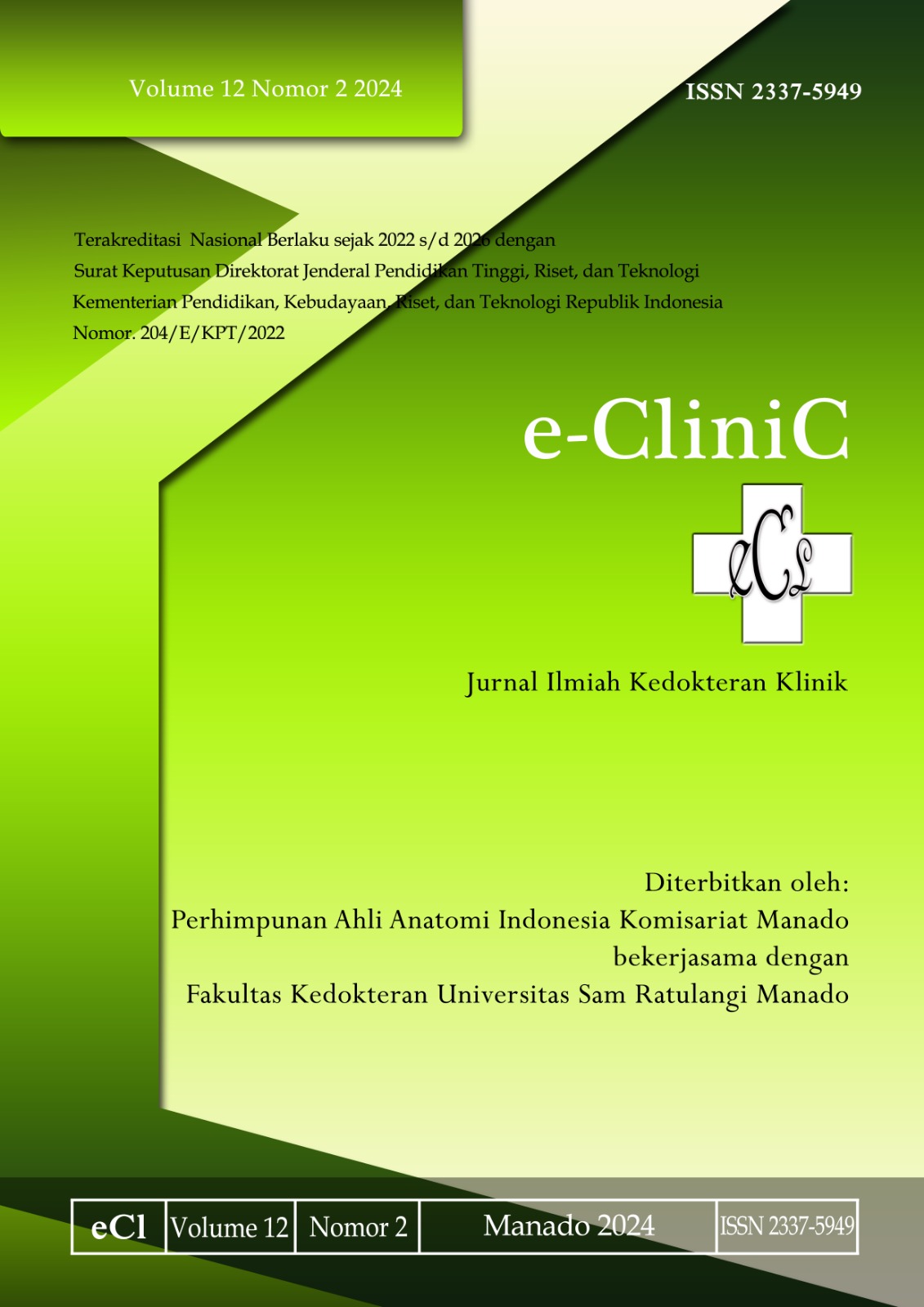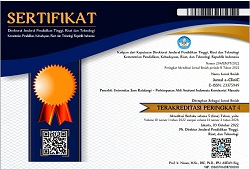Pengaruh Radioterapi Short-course Neoadjuvant terhadap Kadar Carcino-embryonic Antigen pada Adenokarsinoma Rekti
DOI:
https://doi.org/10.35790/ecl.v12i2.51820Abstract
Abstract: Neoadjuvant therapy is starting to be used as an alternative treatment in type A medical centers, however, there is still no specific consensus in determining the role and type of neoadjuvant therapy in adenocarcinoma recti patients. As a result, the use of neoadjuvant therapy is still not widely used. This study aimed to compare the outcome in the form of carcinoembryonic antigen (CEA) in patients who continued surgery with short-course neoadjuvant radiotherapy with those who did not. This was a descriptive and retrospective study. Samples were recti cancer patients stage II – IV at Prof. Dr. R. D. Kandou Hospital Manado in the medical record of 2017-2022. Patients were divided into two groups, those who received short-course neoadjuvant radiotherapy and the control group with similar characteristics. The results showed that there was a difference in the decrease of CEA in the two groups. The mean decrease of CEA in the short-course neoadjuvant group was 16.54 5 µg/L which was higher compared to the control group 5.64 5 µg/L. In conclusion, neoadjuvant short-course radiotherapy can decrease the CEA level in adenocarcinoma recti patients.
Keywords: adenocarcinoma recti; short-course neoadjuvant radiotherapy; carcinoembryonic antigen
Abstrak: Terapi neoadjuvan mulai digunakan sebagai alternatif penanganan pada pusat kesehatan tipe A, namun belum ada konsensus spesifik dalam penentuan peran dan tipe terapi neoadjuvan pada pasien adenokarsinoma rekti sehingga terapi ini belum dapat digunakan secara bebas. Penelitian ini bertujuan untuk membandingkan luaran berupa kadar carcinoembryonic antigen (CEA) pada pasien yang melanjutkan tindakan operasi dan radioterapi short-course neoadjuvant maupun yang tidak. Jenis penelitian ialah deskriptif retrospektif menggunakan pasien kanker rekti stadium II hingga IV di RSUP Prof. Dr. R. D. Kandou Manado yang terdata di rekam medis periode tahun 2017-2022. Pasien dibagi atas dua kelompok yaitu yang menerima radioterapi short-course neoadjuvant dan kelompok kontrol dengan karakteristik serupa. Hasil penelitian memperlihatkan bahwa terdapat perbedaan penurunan kadar CEA yang bermakna pada pasien adenokarsinoma rekti yang dilakukan radioterapi neoadjuvant short-course dibandingkan dengan kontrol. Rerata penurunan nilai CEA pada kelompok yang menjalani radioterapi short-course neoadjuvant sebanyak 16,54 5 µg/L, lebih tinggi dibandingkan pada kelompok kontrol sebanyak 5,64 5 µg/L. Simpulan penelitian ini ialah pemberian radioterapi neoadjuvant short-course dapat menurunkan kadar CEA pada pasien adenokarsinoma rekti.
Kata kunci: adenokarsinoma rekti, terapi short-course neoadjuvant; carcinoembryonic antigen
References
American Cancer Society. Colorectal Cancer Facts & Figures 2020-2022. Atlanta: American Cancer Society; 2020. p. 1-41. Available from: https://www.cancer.org/content/dam/cancer-org/research/cancer-facts-and-statistics/colorectal-cancer-facts-and-figures/colorectal-cancer-facts-and-figures-2020-2022.pdf
Rawla P, Sunkara T, Barsouk A. Epidemiology of colorectal cancer: incidence, mortality, survival, and risk factors. Prz Gastroenterol. 2019;14(2):89–103. Doi: 10.5114/pg.2018.81072
Panduan Pelayanan Klinis Kanker Rektum (1st ed). Jakarta: Kementerian Kesehatan Republik Indonesia; 2013.
Feeney G, Sehgal R, Sheehan M, Hogan A, Regan M, Joyce M, et al. Neoadjuvant radiotherapy for rectal cancer management. World Journal of Gastroenterology. 2019;25(33):4850–69. Doi: 10.3748/wjg.v25.i33.4850
Benson AB, Venook AP, Al Hawary MM, Azad N, Chen YJ, Ciombor KK, et al. NCCN Guidelines Version 3.2022 Rectal Cancer Continue NCCN Guidelines Panel Disclosures. 2022. Available from: https://www.nccn.org/home/member
Shiller M, Boostrom S. The molecular basis of rectal cancer. Clin Colon Rectal Surg. 2015;28(1):53–60. Doi: 10.1055/s-0035-1545070
Nguyen HT, Duong HQ. The molecular characteristics of colorectal cancer: Implications for diagnosis and therapy. Oncology Letters. 2018;16(1):9–18. Doi: 10.3892/ol.2018.8679
Sudibio, Ramli I. Referat-2 Radiasi praoperatif dalam tatalaksana kanker rektum. Jakarta; PORI; 2018.
Sauer R, Becker H, Hohenberger W, Rödel C, Wittekind C, Fietkau R, et al. Preoperative versus postoperative chemoradiotherapy for rectal cancer. N Engl J Med. 2004;351(17):1731-40. Doi: 10.1056/NEJMoa040694
Roh MS, Colangelo LH, O’Connell MJ, Yothers G, Deutsch M, Allegra CJ, et al. Preoperative multimodality therapy improves disease-free survival in patients with carcinoma of the rectum: NSABP R-03. J Clin Oncol. 2009;27(31):5124–30. Doi: https://doi.org/10.1200/JCO.2009.22.0467
Downloads
Published
How to Cite
Issue
Section
License
Copyright (c) 2024 Jeffri Jeffri, Ferdinand Tjandra, Toar D. B. Mambu, Enrico Napitupulu

This work is licensed under a Creative Commons Attribution-NonCommercial 4.0 International License.
COPYRIGHT
Authors who publish with this journal agree to the following terms:
Authors hold their copyright and grant this journal the privilege of first publication, with the work simultaneously licensed under a Creative Commons Attribution License that permits others to impart the work with an acknowledgment of the work's origin and initial publication by this journal.
Authors can enter into separate or additional contractual arrangements for the non-exclusive distribution of the journal's published version of the work (for example, post it to an institutional repository or publish it in a book), with an acknowledgment of its underlying publication in this journal.
Authors are permitted and encouraged to post their work online (for example, in institutional repositories or on their website) as it can lead to productive exchanges, as well as earlier and greater citation of the published work (See The Effect of Open Access).







